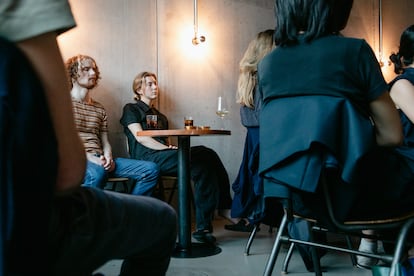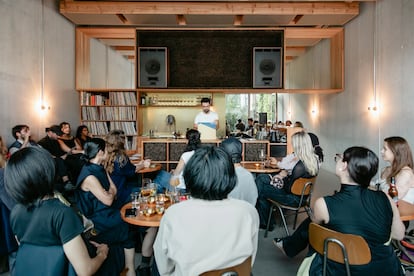Half a hundred people in a place in Wedding, the multicultural neighborhood, worker, gentrified and somewhat ramshackled in northern Berlin. They have not come to dance, although this city is the old capital of the techno, or chat with friends, although this was also the capital of conversations and coffees. They are silent, sitting and absorbed by the sound of the speakers that dominate the room. No hurry or stress. It’s about “leaving the algorithm,” as he says a few minutes before the Matteo session, the Italian. Soon, Matteo will present the public Crêuza de Mäthe vinyl of the Italian singer -songwriter Fabrizio de André that tonight we will hear whole. Face A and B, 35 minutes. From beginning to end, almost religiously. “A meditative experience,” will then summarize one of the attendees, a South African who is visiting Germany and identifies as Sky, and adds: “But shared.”
This is migas: thus, in lowercase and in Spanish. And this is what is called a listening bar or a listening bar, booming phenomenon in Berlin and other global cities (there are in Los Angeles, in New York, in Barcelona too). The origin is Japanese and dates from the fifties. Fans met with the sole objective of listening to music with high quality sound equipment. Luis Feduchi, the Spanish architect based in Berlin who has designed the interior of crumbs, makes a simile with theater and cinema. “If a live concert has scenographic, or theatrical qualities, a listening session looks more like the visual experience of cinema,” he says. This is the time in which we have all the music in the world at hand. In which music is often an individual experience with the headphones that isolate us while nervously we pass from one song to another. The idea of listening bar He is going against all this.
July 10, five in the afternoon, world premiere in crumbs from the new album of Icelandic artist Olafur Arnalds, A Dawning. Here are Feduchi and there, at the bar, José Manuel Jiménez Moreno, or Jom start-ups And one day he left everything to create crumbs. “It all started wondering what mattered in life …”, recalls Joma, architect, authentic ideologist and project orchestra of the project. Here are also the Arnalds fans, who recorded this album with the late Irish artist Talos. The experience is unique: listen, nothing more. Neither look at the mobile, nor speak, nor jump the song if it does not catch us to the first. “Attentive listening,” observes the architect, “derives in thoughts that go beyond sound.” There are those who close their eyes. Or draw, or write. Or it is simply catching by this kind of musical amniotic fluid that floods the premises isolated from the urban bustle where a strange connection, or “resonance” occurs, as Hartmut Rosa, the philosopher of the “deceleration” would say.
This go listening barslike other experiences of these accelerated times and hyperconnected in rich and western societies: the return to the analog – the transistor, the paper book, the bike -, the luxury of disconnection. “I liked to bring friends home, take care of them, cook, share moments, live more slowly,” Joma recalled this Thursday at a crumb table before a vermouth and olives before the André Fabrizio listening session. “I asked them to leave the mobile at the entrance,” he continues. “And I realized that I wanted more music in my life, but I couldn’t think of a place to enjoy music that was not electronic dance music. Why not create a bar where you can talk without screaming and where to live a little more slowly and calm?” He opened it in January 2024.

Luis Feduchi tells to visit a few years ago the listening bar in Sheep’s Clothing (with leather from the lamb), of Los Angeles, influenced his way of designing crumbs. It was decisive, once the project was running, which develops in collaboration with a sound engineer and a carpenter, transforming the bar into the click command post and placing a drawer of more than 120 kilos, “a furniture”, describes, “or an altar, or an altarpiece”, within which “the true protagonists are located, without which the bar would not be a listening bar”That is, the speakers. This – the bar where the puncthe and the altar with the speakers officiates – is the first thing the visitor sees how much it enters the premises, and where he will direct his attention during the listening. Feduchi remembers once he was clicking the German Robert Henke, one of the renowned figures that have officiated behind these bar. “Nothing was more important than sound. Neither drinks, nor people, no architecture. That cannot happen in a normal bar. Not even in a disco, where people and dance prevail on sound. ”
June 24, seven in the afternoon, the bar begins to fill. Twenty -year -old and thirties, elegant men and women, much expatriate: the vehicular language here is global English, as is the increasing parts of Berlin. Matteo, the master of ceremonies tonight, presents Fabrizio de André and Crêuza de Mähis 1984 masterpiece, sung in Genoese dialect, “a trip to the mediterranean, ”he says, a trip. It is music and it is the noise the streets. Silence in the living room is total. Music is inescapable, invades everything, and listeners have the feeling that they too They enter In music and as by magic the musicians and their instruments are here (The New York Timeswhen reviewing a listening session from a album by Carole King in in Sheep’s Clothing, he said: “While listening to this album, let’s say it seemed to me that I knew Carole King’s mother”). There is something incongruous in the scene; Dozens of people in devoted silence before an exotic LP of an artist that most had never heard. “You come blind. You take it as it is,” says Sophia, a South African of the Cabo del Cabo who lives in Berlin, and Sky, his companion, describes the experience: “Through the songs, we all embarked on the same trip.”

